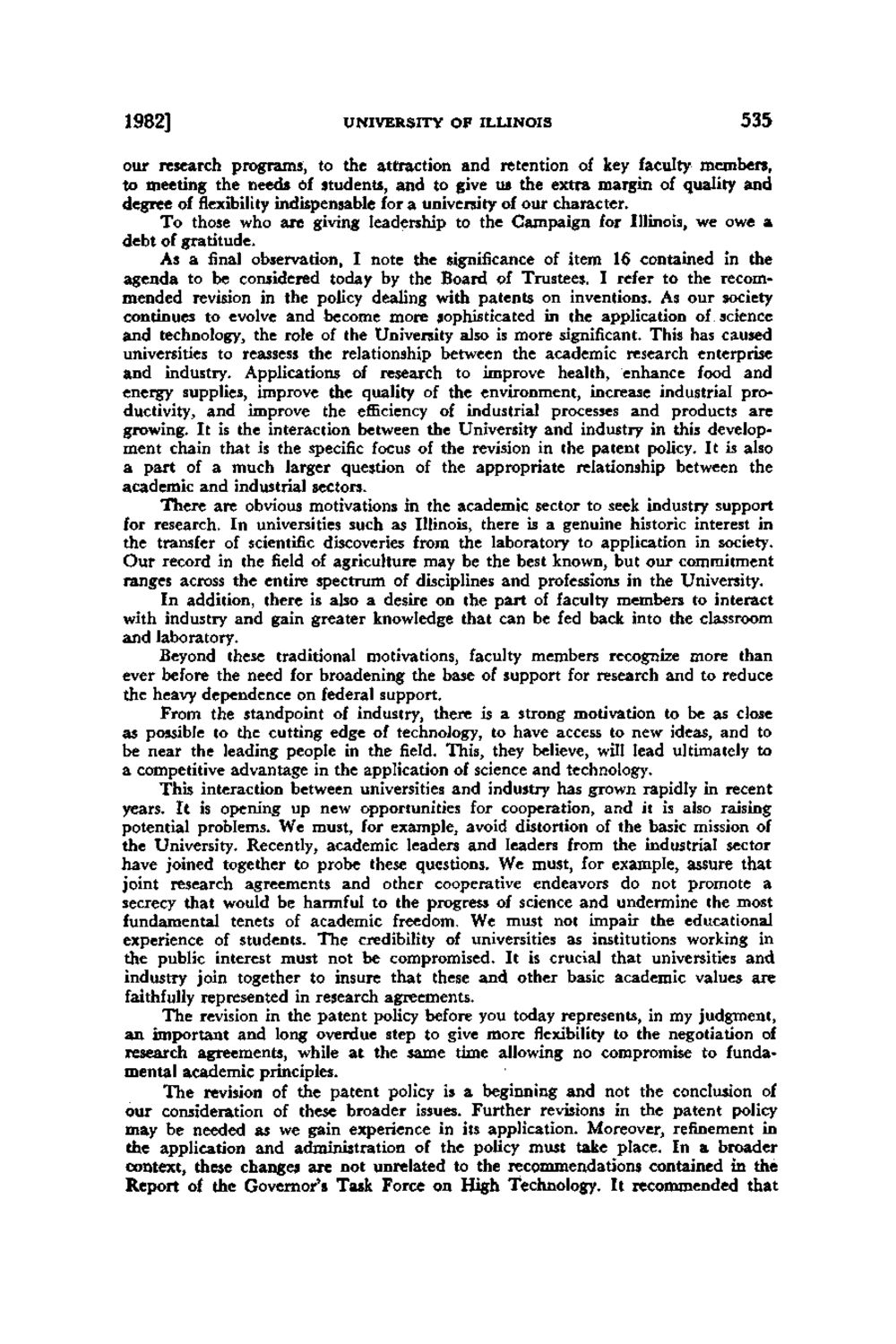| |
| |
Caption: Board of Trustees Minutes - 1982
This is a reduced-resolution page image for fast online browsing.

EXTRACTED TEXT FROM PAGE:
1982] UNIVERSITY OF ILLINOIS 535 our research programs, to the attraction and retention of key faculty members, to meeting the needs of students, and to give us the extra margin of quality and degree of flexibility indispensable for a university of our character. T o those who are giving leadership to the Campaign for Illinois, we owe a debt of gratitude. As a final observation, I note the significance of item 16 contained in the agenda to be considered today by the Board of Trustees. I refer to the recommended revision in the policy dealing with patents on inventions. As our society continues to evolve and become more sophisticated in the application of science and technology, the role of the University also is more significant. This has caused universities to reassess the relationship between the academic research enterprise and industry. Applications of research to improve health, enhance food and energy supplies, improve the quality of the environment, increase industrial productivity, and improve the efficiency of industrial processes and products are growing. It is the interaction between the University and industry in this development chain that is the specific focus of the revision in the patent policy. It is also a part of a much larger question of the appropriate relationship between the academic and industrial sectors. There are obvious motivations in the academic sector to seek industry support for research. In universities such as Illinois, there is a genuine historic interest in the transfer of scientific discoveries from the laboratory to application in society. Our record in the field of agriculture may be the best known, but our commitment ranges across the entire spectrum of disciplines and professions in the University. In addition, there is also a desire on the part of faculty members to interact with industry and gain greater knowledge that can be fed back into the classroom and laboratory. Beyond these traditional motivations, faculty members recognize more than ever before the need for broadening the base of support for research and to reduce the heavy dependence on federal support. From the standpoint of industry, there is a strong motivation to be as close as possible to the cutting edge of technology, to have access to new ideas, and to be near the leading people in the field. This, they believe, will lead ultimately to a competitive advantage in the application of science and technology. This interaction between universities and industry has grown rapidly in recent years. It is opening up new opportunities for cooperation, and it is also raising potential problems. We must, for example, avoid distortion of the basic mission of the University. Recently, academic leaders and leaders from the industrial sector have joined together to probe these questions. We must, for example, assure that joint research agreements and other cooperative endeavors do not promote a secrecy that would be harmful to the progress of science and undermine the most fundamental tenets of academic freedom. We must not impair the educational experience of students. The credibility of universities as institutions working in the public interest must not be compromised. It is crucial that universities and industry join together to insure that these and other basic academic values are faithfully represented in research agreements. The revision in the patent policy before you today represents, in my judgment, an important and long overdue step to give more flexibility to the negotiation of research agreements, while at the same time allowing no compromise to fundamental academic principles. T h e revision of the patent policy is a beginning and not the conclusion of our consideration of these broader issues. Further revisions in the patent policy may be needed as we gain experience in its application. Moreover, refinement in the application and administration of the policy must take place. In a broader context, these changes are not unrelated to the recommendations contained in the Report of the Governor's Task Force on High Technology. It recommended that
| |